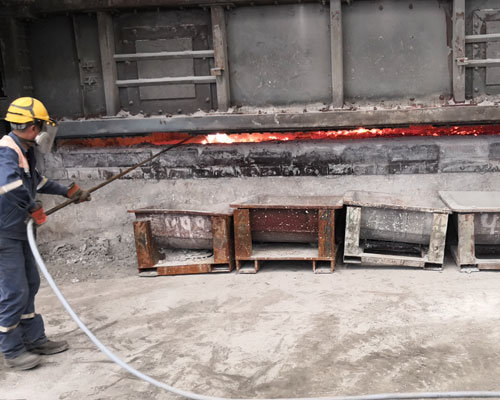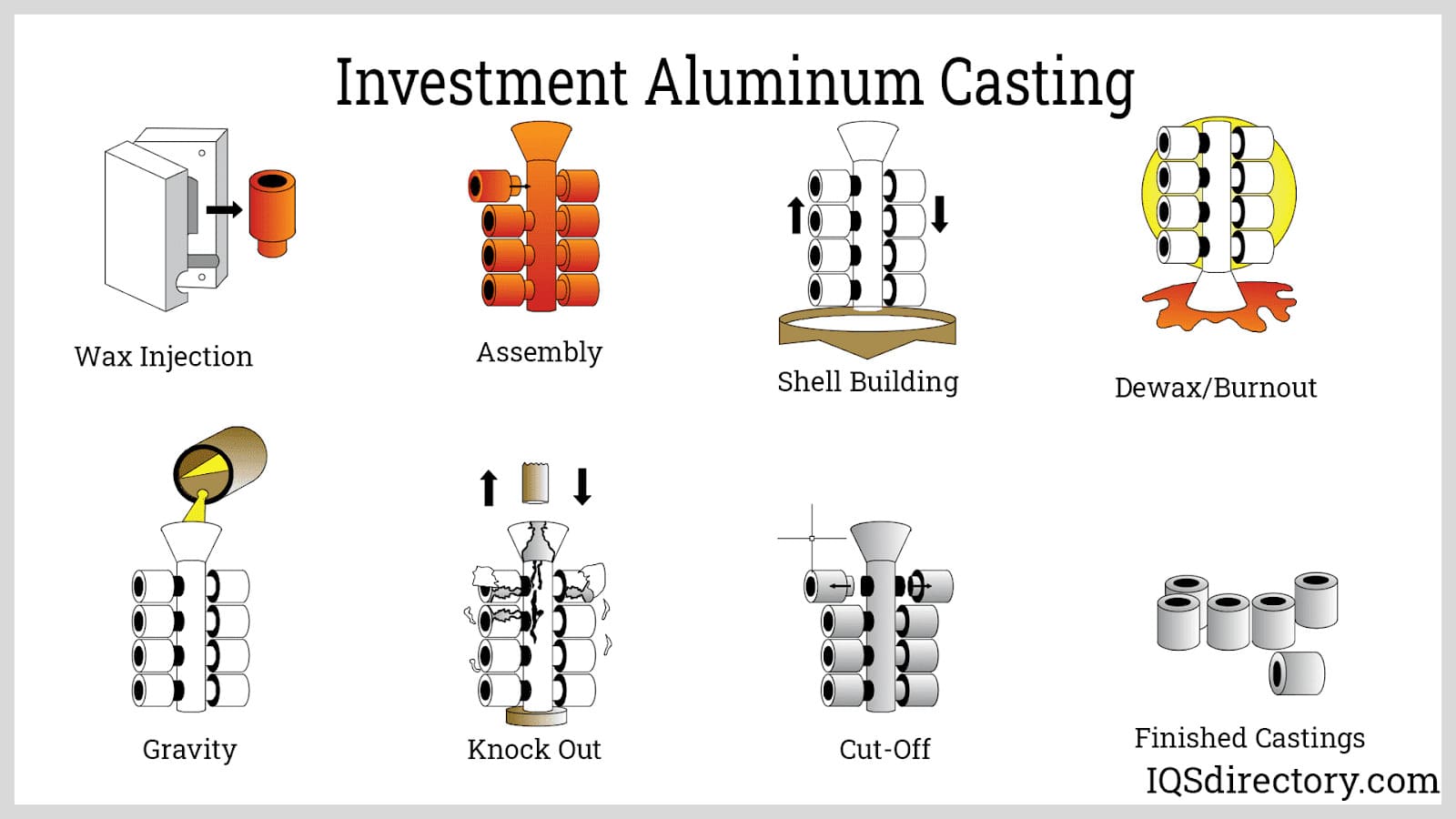Discover what makes Aluminum Foundry reliable in aluminum casting applications
Wiki Article
The Role of Aluminum Foundry in Enhancing Production Performance Across Diverse Sectors
Aluminum factories serve a crucial function in contemporary manufacturing by boosting manufacturing effectiveness throughout different markets. They harness progressed strategies and sustainable techniques to maximize operations and reduce waste. The impact of Aluminum reaches markets such as auto, aerospace, and building and construction, where its one-of-a-kind residential properties boost efficiency. The difficulties faced by these foundries could shape their future. Aluminum Foundry. Understanding these dynamics discloses an intricate landscape of advancement and adaptationThe Significance of Aluminum in Modern Manufacturing

The versatility of Aluminum makes it possible for a wide range of construction techniques, including casting, extrusion, and machining. Its recyclability further underscores its significance, as recycled Aluminum needs considerably less energy to create than new Aluminum, straightening with modern environmental goals. As industries remain to evolve, Aluminum's one-of-a-kind qualities and adaptability guarantee it remains a necessary material for driving technology and effectiveness in producing processes. Its payments prolong beyond capability, supporting economic growth and sustainability efforts around the world.
Secret Processes in Aluminum Foundries
In Aluminum shops, numerous key processes are necessary for achieving high manufacturing efficiency. Thawing and alloying methods, together with molding and spreading techniques, play a vital function in forming the final item. Additionally, executing strict top quality control determines guarantees that the result meets market requirements.Melting and Alloying Strategies
Although melting and alloying are essential procedures in Aluminum factories, their efficiency considerably affects total manufacturing high quality and expense. The melting process normally entails the usage of electrical heating systems or gas-fired systems, which permit accurate temperature control. This ensures that Aluminum reaches its excellent melting point, minimizing power usage. Alloying, on the various other hand, requires the addition of certain elements to achieve preferred material homes, such as toughness and deterioration resistance. Techniques such as pre-alloying and in-situ alloying are typically used to enhance consistency and reduce waste. Mindful monitoring throughout both melting and alloying stages is vital, as it straight affects the material characteristics and warranties compliance with sector standards, inevitably causing boosted manufacturing efficiency across different fields.Molding and Casting Methods
A selection of molding and spreading approaches are important to the efficiency and quality of Aluminum shops. Among these approaches, sand casting, pass away spreading, and irreversible mold casting stand out due to their one-of-a-kind advantages. Sand spreading supplies flexibility for intricate forms and is cost-effective for reduced production quantities. Die spreading, known for its accuracy and repeatability, is suitable for high-volume manufacturing, supplying outstanding surface area finishes and dimensional precision. Permanent mold and mildew spreading integrates the benefits of both sand and pass away spreading, permitting far better mechanical properties and decreased product waste. Each technique offers details applications across varied fields, allowing Aluminum shops to enhance production procedures, reduce lead times, and meet differing customer demands efficiently.Quality Assurance Steps
Assuring high-quality Aluminum products needs strenuous top quality control actions at every phase of the Foundry procedure. These actions begin with the selection of raw materials, where extensive testing for impurities and composition is vital. Assessments throughout the molding and spreading stages keep track of dimensions and surface area quality to avoid flaws once products are accepted. Advanced techniques, such as non-destructive screening, are employed to discover interior problems that may endanger product stability. Furthermore, process control systems constantly monitor temperature and alloy make-up to keep consistency. Last evaluations, including mechanical residential property testing, validate that the products fulfill sector criteria. By implementing these rigorous top quality control protocols, Aluminum foundries boost production efficiency and guarantee the integrity of their items throughout diverse markets.Innovations Driving Production Effectiveness
Advancements in Aluminum shops are revolutionizing manufacturing effectiveness with advanced casting techniques and the combination of automation and robotics. These developments not just simplify operations however also improve precision and minimize waste. Furthermore, sustainable material innovations are contributing to more eco-friendly methods within the market.Advanced Casting Techniques
Many innovative casting techniques are transforming the Aluminum Foundry market, substantially boosting manufacturing performance. Methods such as die casting, sand spreading, and investment casting have developed, permitting enhanced accuracy and lowered waste. Technologies like computer-aided layout (CAD) and simulation software application allow foundries to maximize mold design and anticipate possible issues before manufacturing, minimizing pricey errors - Aluminum Foundry. Furthermore, using alloy advancement techniques enhances product properties, causing products that fulfill rigorous performance demands. Strategies such as quick prototyping and 3D printing are also getting grip, helping with faster turnaround times for complicated geometries. These advancements not just enhance production procedures but also add to sustainability initiatives by reducing power usage and enhancing product application in the Aluminum casting industry
Automation and Robotics Integration
The combination of automation and robotics in the Aluminum Foundry market is revolutionizing production effectiveness. By using sophisticated robot systems for tasks such as molding, putting, and ending up, shops are noticeably reducing labor prices and lessening human error. Automated procedures improve assembly line, enabling faster turn-around times and constant top quality in produced elements. Additionally, the execution of real-time monitoring systems makes it possible for operators to track performance metrics and maximize operations proactively. Robotics also improves safety by taking control of hazardous jobs, consequently minimizing work environment accidents. As the technology proceeds to evolve, the Aluminum Foundry industry is poised to take advantage of these technologies better, making certain competitiveness and responsiveness in an increasingly demanding market.
Sustainable Material Innovations
As the Aluminum Foundry industry looks for to boost production efficiency, lasting product technologies are arising as a vital aspect. These advancements consist of the growth of eco-friendly alloys and using recycled Aluminum, substantially reducing the environmental impact of production procedures. Advanced strategies, such as additive manufacturing and eco-friendly spreading methods, enable factories to lessen waste while improving material buildings. In addition, the integration of bio-based binders and finishings results in healthier functioning settings and lowers emissions. The adoption of life process evaluation devices more aids shops in recognizing sustainability opportunities, aligning with worldwide patterns towards responsible manufacturing. These innovations not only boost production efficiency but also place the Aluminum Foundry market as a leader in sustainable commercial techniques.Environmental Sustainability in Aluminum Casting
While Aluminum spreading has actually long been a staple in manufacturing, its environmental influence has motivated a shift in the direction of even more sustainable techniques. Several foundries are now embracing environment-friendly techniques to decrease waste and power usage. By making use of recycled Aluminum, foundries significantly minimize the need for virgin materials, therefore decreasing and preserving all-natural resources greenhouse gas emissions.Innovations such as innovative melting innovations and boosted heater layouts in addition improve energy effectiveness. Implementing closed-loop systems allows for the recycling of by-products and scraps, minimizing garbage dump payments. On top of that, the usage of water-based layers and naturally degradable products in the spreading process reduces damaging emissions and ecological toxic substances.
As sectors significantly prioritize sustainability, the Aluminum spreading industry is straightening with these values, demonstrating that economic development and ecological duty can exist side-by-side. This commitment to lasting practices not just benefits the environment however also positions Aluminum foundries as leaders in accountable production.
Applications of Aluminum Elements in Numerous Industries
Aluminum parts are progressively utilized throughout numerous markets due to their one-of-a-kind residential properties, that include lightweight strength, corrosion resistance, and exceptional thermal conductivity. In the automotive sector, Aluminum is crucial for producing lighter automobiles, adding to enhanced fuel performance and minimized emissions. The aerospace market leverages Aluminum alloys for aircraft components, taking advantage of their high strength-to-weight proportion, which enhances performance and safety and security.In construction, Aluminum is favored for windows, doors, and roofing as a result of its durability and aesthetic appeal. The electrical market employs Aluminum Aluminum Foundry in power lines and parts, benefiting from its conductivity and resistance to deterioration. Furthermore, the durable goods market uses Aluminum in packaging and home items, advertising sustainability with recyclability (Aluminum Foundry). Generally, Aluminum components play an important function ahead of time technical innovations and operational efficiencies throughout varied industries, highlighting their significance in modern-day production and design
Challenges Faced by Aluminum Foundries
Countless difficulties confront Aluminum factories, influencing their effectiveness and efficiency. One substantial concern is the volatility of raw product prices, which can vary unexpectedly, influencing operational costs and earnings margins. In addition, foundries commonly grapple with rigorous ecological regulations, calling for expensive investments in sustainable methods and waste administration systems. Labor scarcities existing one more difficulty, as the skilled workforce required for specialized procedures comes to be increasingly scarce, bring about possible hold-ups and quality assurance problems.Technical integration presents obstacles; foundries have to consistently adjust to improvements in automation and electronic devices to stay affordable. Ineffectiveness in production processes, such as inadequate melting and spreading methods, can additionally impede outcome. Finally, the need for personalized services across numerous industries pressures foundries to stabilize adaptability with effectiveness, complicating manufacturing timetables. Together, these obstacles produce a complicated landscape that Aluminum shops need to browse to improve their overall effectiveness.
Future Patterns in Aluminum Foundry Modern Technology
As the Aluminum Foundry sector advances, emerging modern technologies are established to reinvent manufacturing procedures and improve efficiency. Technologies in automation, such as robotics and expert system, are anticipated to enhance operations, minimize labor expenses, and improve precision. On top of that, developments in 3D printing technology will certainly enable for the quick prototyping of intricate Aluminum elements, decreasing preparations and product waste.Furthermore, the combination of IoT (Net of Points) will enable real-time tracking of production processes, permitting anticipating maintenance and lessening downtime. Sustainability will likewise play a crucial duty, with a boosting emphasis on recycling and energy performance in Foundry procedures.

Often Asked Inquiries
What Are the Prices Connected With Aluminum Foundry Manufacturing?
The expenses connected with Aluminum Foundry production consist of basic material expenses, labor costs, power consumption, maintenance of tools, and overhead. These aspects jointly affect the overall economic viability and performance of the Foundry operations.Just How Do Foundries Make Certain Quality Assurance in Aluminum Casting?
Factories guarantee high quality control in Aluminum casting via strenuous screening protocols, consisting of product evaluation, dimensional evaluations, and process monitoring. Implementing standard treatments and making use of advanced technologies aids keep consistency and meet industry requirements throughout production.What Safety Procedures Are Implemented in Aluminum Foundries?
Precaution in Aluminum foundries consist of personal safety equipment, proper ventilation systems, regular safety training, emergency procedures, and equipment upkeep. These techniques aim to minimize risks, making certain the wellness of workers and preserving functional efficiency.Just how Long Does the Aluminum Spreading Process Typically Take?
The Aluminum casting procedure commonly takes a number of hours to several days, relying on variables like the complexity of the design, the dimension of the cast, and the particular techniques used by the Foundry.What Abilities Are Needed to Function in an Aluminum Foundry?
To work in an Aluminum Foundry, individuals require skills such as metallurgy understanding, machining proficiency, focus to detail, analytical capabilities, and teamwork. Safety and security understanding and technical experience in casting processes are also essential for effective operation.Its recyclability additionally highlights its value, as recycled Aluminum requires considerably less power to produce than new Aluminum, lining up with contemporary environmental goals. A selection of molding and casting methods are important to the efficiency and top quality of Aluminum shops. Developments in Aluminum factories are changing manufacturing efficiency with innovative spreading techniques and the combination of automation and robotics. Numerous advanced spreading methods are transforming the Aluminum Foundry market, substantially boosting production effectiveness. Shops guarantee quality control in Aluminum spreading with extensive screening protocols, consisting of product evaluation, dimensional inspections, and procedure tracking.
Report this wiki page